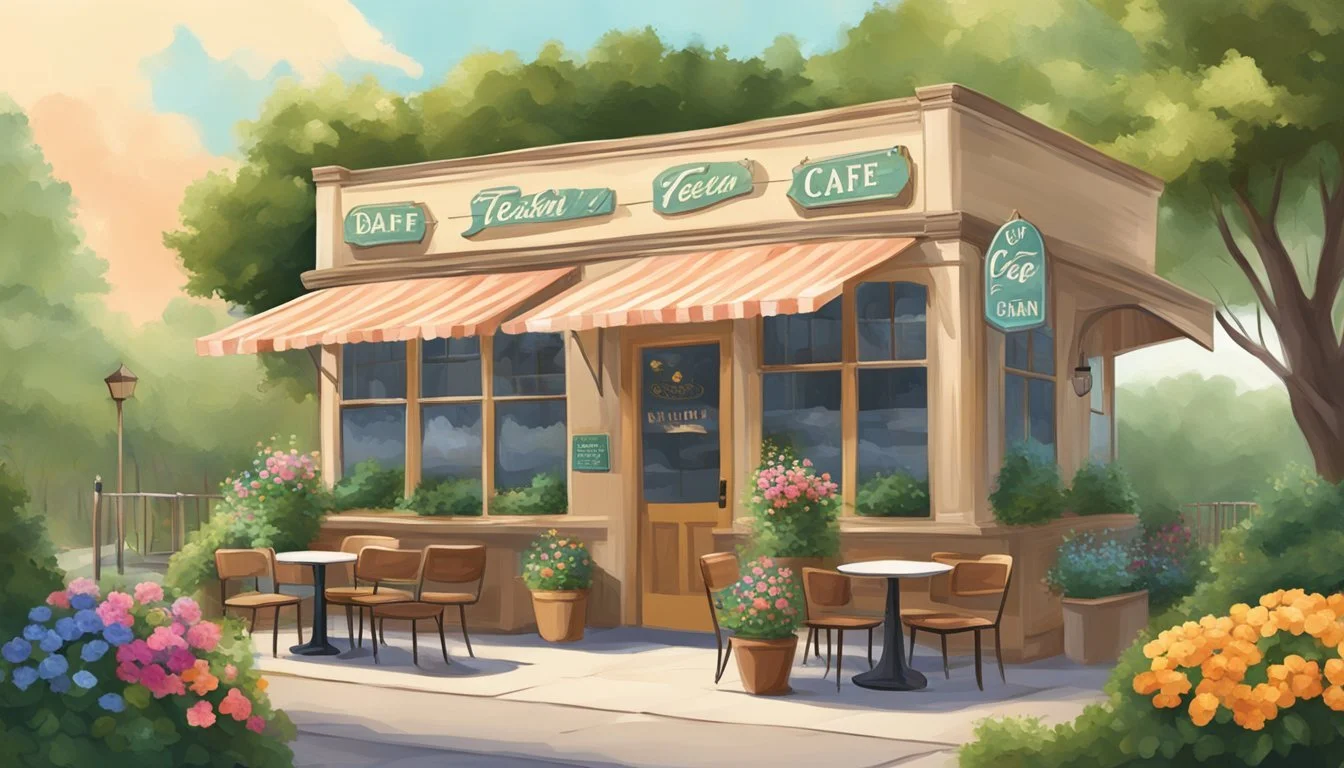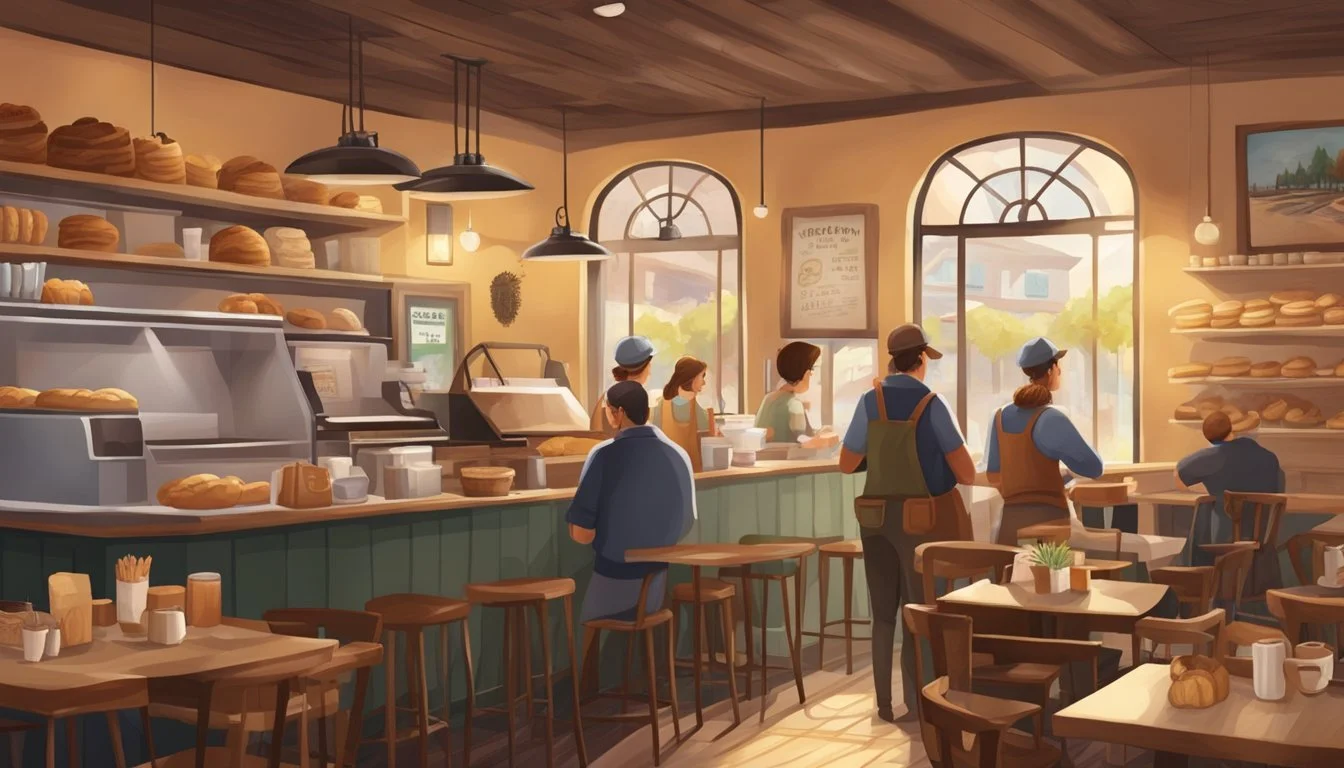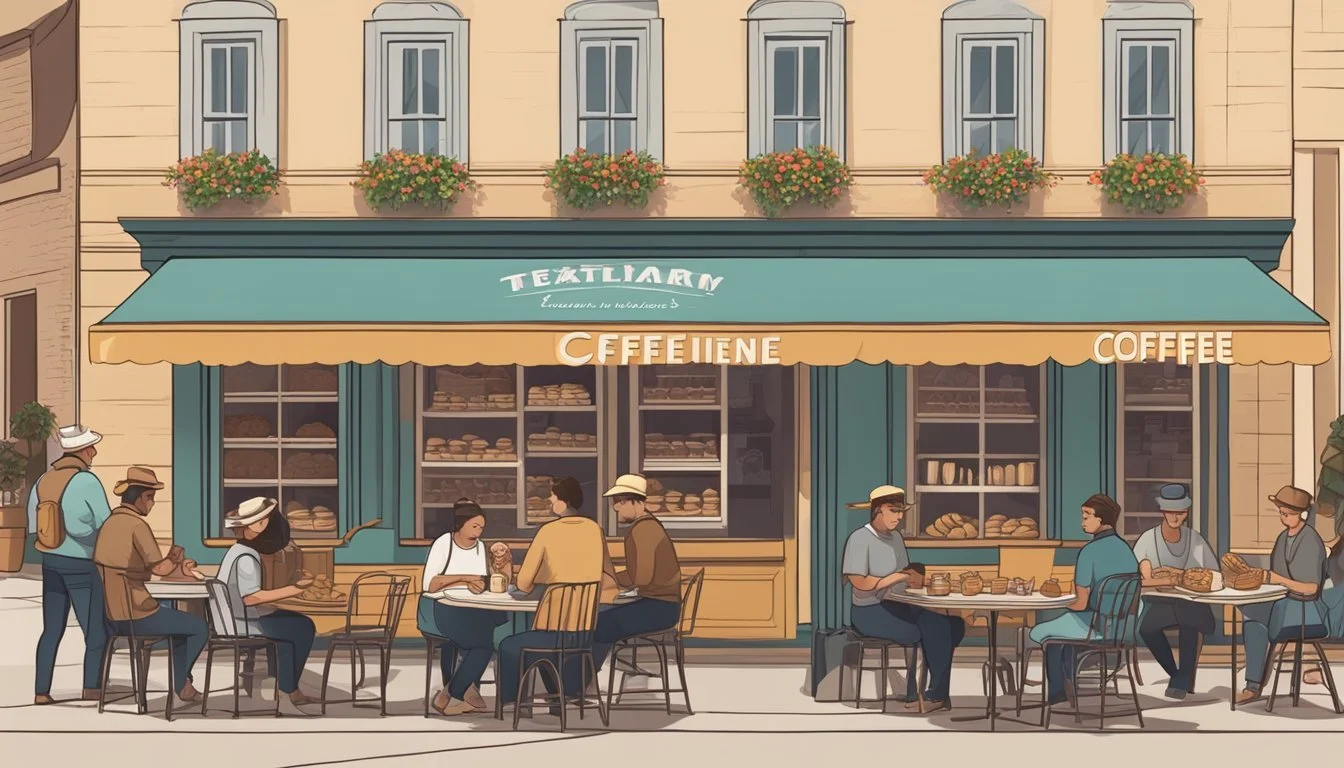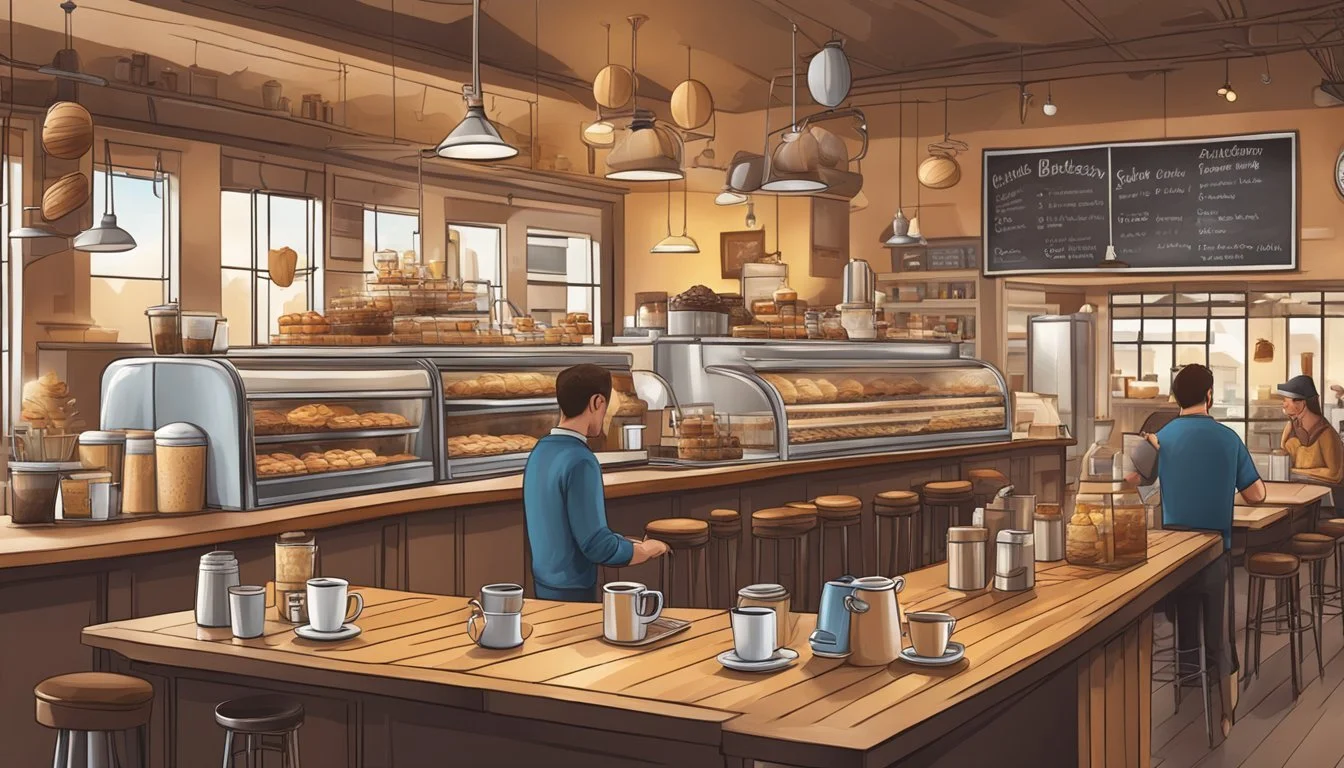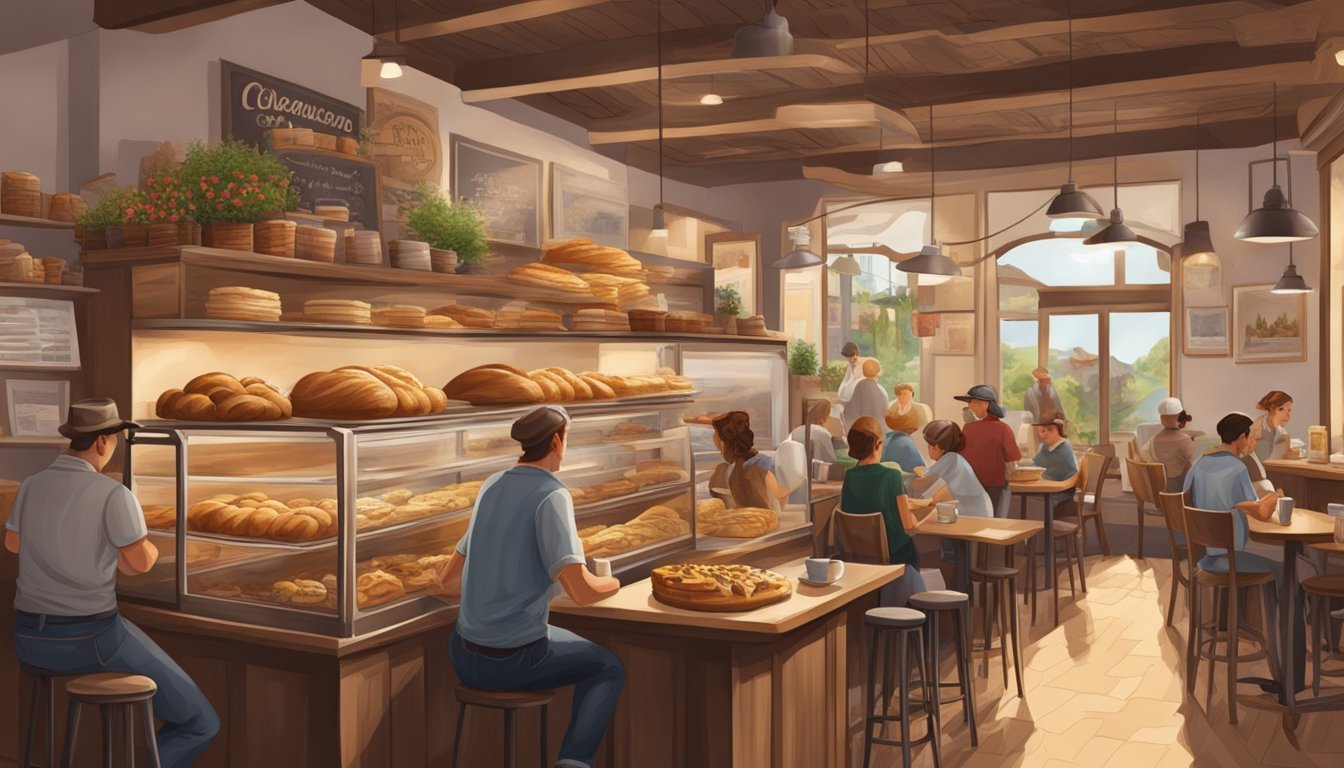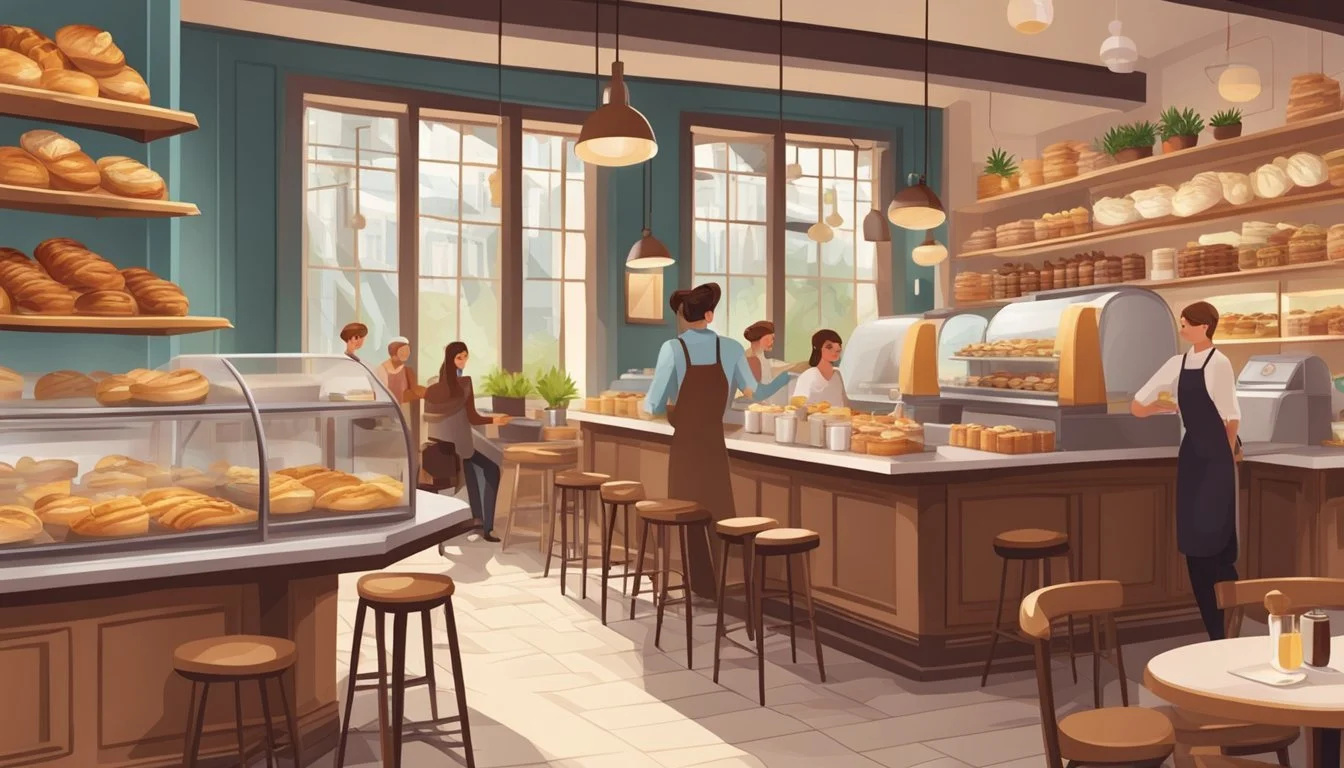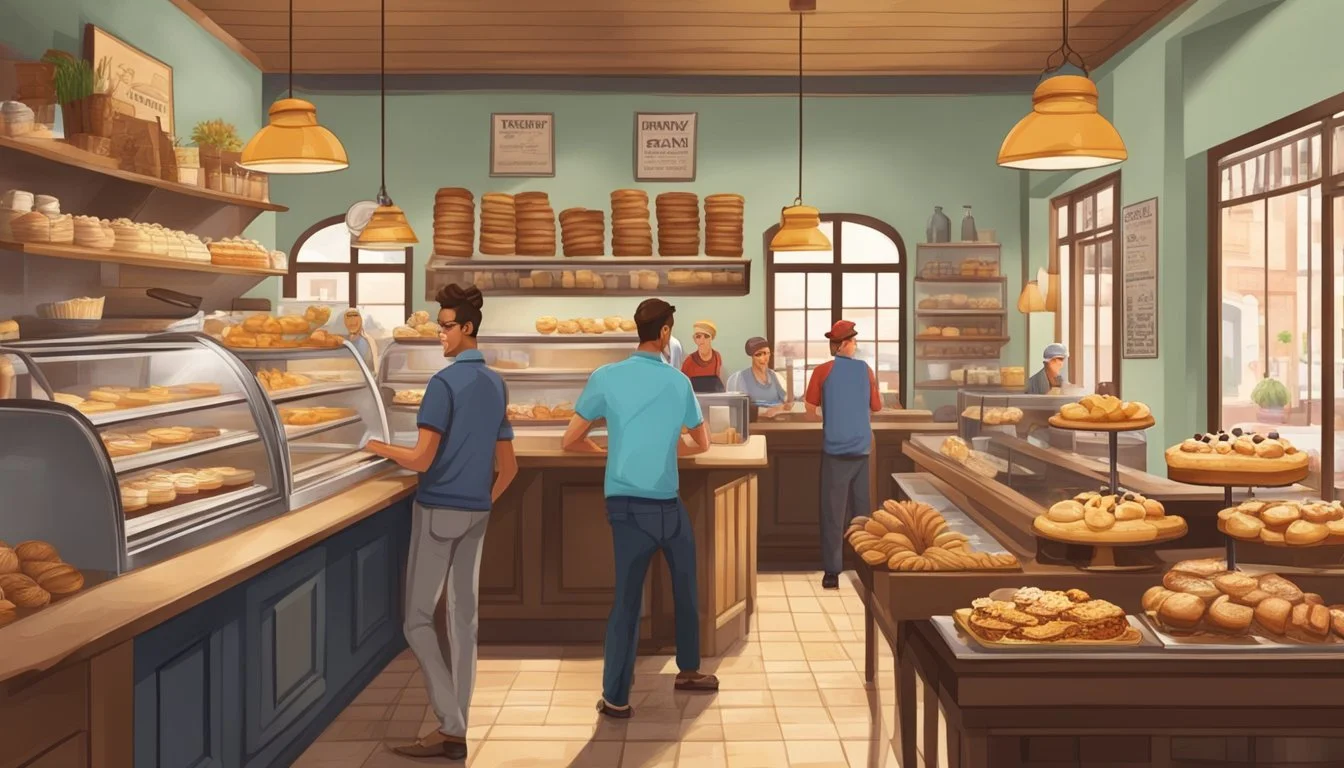The History of German Texan Bakery Cafes and Coffee Shops
A Culinary Chronicle
The fusion of German heritage with Texan culture has resulted in a rich tapestry of culinary traditions, particularly evident in the state's bakery cafes and coffee shops. When German immigrants settled in Texas during the 19th century, they brought with them distinctive baking techniques and a fondness for communal gathering spots, such as Konditoreien (pastry shops) and coffee houses. These establishments became a cornerstone of local communities, serving as places to convene, share news, and enjoy traditional German pastries and coffee. Over time, these German Texan businesses have become an integral part of the state's social and cultural identity.
As one of the oldest operating bakeries in Texas, Eilenberger's Bakery in Palestine has been serving residents since 1898, and Naegelin's Bakery, located in New Braunfels, dates even further back to 1868. These historic bakeries exemplify the enduring legacy of German craftsmanship in baking and have become landmarks in their communities. They retain their popularity by continuing to offer a taste of Germany's rich baking traditions through their bread, pastries, and cakes, which they have been creating for well over a century.
In cities like Fredericksburg and New Braunfels, as well as in neighborhoods of North Texas, German bakery cafes and coffee shops thrive, preserving and celebrating the state’s German heritage. The architecture and ambience of these establishments often reflect the Fachwerk style, further anchoring them in their German roots. Together with annual festivals like Wurstfest in New Braunfels, these locales contribute to the maintenance and growth of German customs within the Texan culinary scene, allowing both residents and visitors to experience a unique blend of cultures through every sip and bite.
Origins of German-Texan Bakeries and Cafes
The German influence on Texan bakeries and cafes is deeply rooted in the state's history. These establishments reflect a rich tapestry of cultural heritage, artfully combining European baking traditions with Texas's local nuances.
European Influences and Immigration
Germany’s baking traditions made their way to Texas with the wave of German immigrants in the 19th century. These immigrants brought with them a profound expertise in pastry making and coffee culture. The first German-Texan bakeries were the harbingers of Europe’s famed café society, reimagined in the Lone Star State to suit its own culture and clientele.
German Settlers in Texas
Texas became home to a significant number of German settlers, who were instrumental in setting up some of the first bakeries and cafes in the state. The oldest of these, dating back to 1898, was established by the Eilenbergers, showcasing the continuity of German baking prowess through the generations. These establishments became social hubs where people congregated not just for bread and pastries but also for community and conversation. The synchronization of the restaurant and café culture from Germany with the local flavors of Texas gave birth to a distinctive food identity that remains cherished to this day.
Development of Coffee and Bakery Culture in Texas
The coffee and bakery scene in Texas is a rich tapestry of traditions, marked by the fusion of European customs with local Texan flair. The legacy of German settlers significantly shaped this, influencing everything from art on café walls to menu offerings.
Adoption and Adaptation of European Customs
When German immigrants arrived in towns such as New Braunfels and Fredericksburg in the 19th century, they brought with them a love for coffee and baked goods. In these new Texan communities, they established bakeries and coffee shops that mirrored the ones back in Germany. The very act of coffee-drinking and visiting bakeries became a cherished ritual, emblematic of the communal and leisurely pace they were accustomed to in Europe.
Coffee: Initially, these establishments served traditional German coffee and were gathering places for social interaction, mirroring the café culture of Europe. Over time, Texan coffee shops incorporated local preferences, which included diverse coffee brewing methods like pour-over and cold brews.
Bakeries: Eilenberger's Bakery, established in 1898, is an example of how these German bakeries became an integral part of Texas history. As one of the oldest operating bakeries, it serves as a testament to the enduring appeal of German baked goods in the state.
Evolution of German Texan Culinary Traditions
The German influence extended beyond the mere replication of European customs. Over the decades, German Texan culinary traditions evolved to include local ingredients and cater to Texan tastes. This blend of cultures led to unique versions of traditional German fare, while also embracing local culinary traditions.
Menu: Menus began to feature items that were distinctly Texan, with an emphasis on local produce and flavors. Items that combined German recipes with Texan ingredients became staples, creating a blend of the two cultures.
Cultural Celebrations: Annual festivals such as Wurstfest in New Braunfels celebrate these culinary intersections, offering a variety of sausages, beer, and German-Texan baked goods. These events have a twofold purpose: they are an homage to German heritage and a celebration of its adaptation into Texan culture.
In these ways, coffee and bakery culture in Texas developed from its German roots into a unique, hybrid culinary phenomenon. This development includes the arts as coffee shops and bakeries often double as galleries for local artists. Moreover, drinks such as tea and wine found their place alongside coffee in German Texan café menus, illustrating the broad palette of beverages that these establishments offer. Through this adaptive process, Texas has celebrated and preserved its German heritage while fostering a distinct coffee and bakery culture.
Rise of Coffee Shops and Cafes in Texas
In Texas, the emergence of coffee shops and cafes has a rich history, drawing from European traditions to become integral to state culture and society.
Integration into Texan Society
The introduction of European-style cafes to Texas began as European immigrants, particularly those from Germany, settled in the state. They brought with them the classic coffee house ethos, which emphasized the enjoyment of espresso-based beverages in a relaxed setting. These early establishments often doubled as social hubs and bakeries, offering a taste of Europe within Texas. Over time, this fusion of Texan and European influences gave rise to a distinctive café culture. The growth of these spaces wasn't just about coffee; it was about fostering community and blending culinary heritages.
Texas-German culture, particularly in towns like New Braunfels, became known for this blend, with places like Krause’s Cafe and Biergarten helping to preserve and promote this unique fusion. They have become landmarks where history, culture, and the practice of enjoying a cup of coffee converge.
Popularity and Expansion
The popularity of coffee shops in Texas mirrors a broader trend in the United States, where the demand for quality coffee and cafe experiences has grown exponentially. In the Lone Star State, this has led to an expansion of coffee shops that cater to a wide range of tastes.
Variety of Offerings: From traditional lattes to innovative cold brews, these establishments offer a myriad of choices for the discerning palate.
Local Roasteries: The trend extends to include local roasteries, which prioritize the craft of coffee-making and support sustainable practices.
Community Spaces: Many cafes have evolved into vital community spaces that support local artists and host events.
Cities like Austin have become noteworthy for their thriving coffee culture, with coffee shops like Merit Coffee, Local Coffee, and Noble Coyote leading the charge. These shops exemplify the Texan coffee scene by providing a selection of high-quality coffee blends, single-origin options, and seasonal drinks, attracting a loyal clientele and contributing to the state's expanding coffee landscape.
Historical Significance of Coffee Houses
Coffee houses have served as significant social and intellectual spaces in German Texan communities, intertwining European traditions of coffee culture with local sensibilities.
Role in Social Dynamics
In the fabric of German Texan society, coffee houses have functioned as a microcosm of the community's social structure. They are more than mere establishments for refreshment; they are arenas where people from various backgrounds converge. Historically, the predecessors of these coffee shops in Europe, notably in Vienna, practiced a coffee culture that encouraged a democratic mixing of classes. This tradition carried into German Texan coffee houses, where farmers, tradespeople, and the local gentry would sit side by side, sipping their coffee, each a part of a cohesive social tapestry.
The formality of the traditional German library, elegant in its structure and offerings, found a casual counterpart in these coffee shops. They became informal extensions of the library, allowing a relaxed environment where knowledge, news, and gossip flowed as freely as the coffee being poured. Over time, they grew into valuable communal spaces where locals gathered not just to drink coffee but to exchange ideas, solidify relationships, and reinforce community bonds.
Intellectual and Cultural Hubs
Within the walls of these coffee houses, the Enlightenment spirit of inquiry and discourse found a welcoming venue abroad. Conversations often veered towards the philosophies and scientific discoveries that characterized the Enlightenment. German Texan coffee shops, emulating the coffeehouse culture of Old World cities like Vienna, morphed into havens for intellectual and cultural discourse.
Tables in these cafes often buzzed with discussions among intellectuals, artists, and writers, their debates and conversations contributing to a vibrant public sphere. The influence of European intellectuals was palpable, as these coffee houses cultivated an atmosphere akin to the Enlightenment-era Viennese coffeehouses, where critical discussion thrived. The fostering of this environment nurtured local Texan artists and thinkers, subsequently enriching the cultural fabric of the region.
German Texan Bakery and Café Enterprises
German Texan bakeries and cafés reflect a rich tradition infused with Old World artisanal skills and recipes. These enterprises are not just culinary establishments but also social hubs that have played a significant role in shaping local communities.
Innovations in Baking and Coffee Brewing
Eilenberger's Bakery and Naegelin's Bakery are cornerstones of innovation within the German Texan bakery scene. They have introduced a variety of baked goods that blend traditional German techniques with Texan flavors.
Eilenberger's Bakery: Has maintained its heritage by producing time-honored recipes since 1898.
Naegelin's Bakery: As Texas' oldest bakery, operating since 1868, is renowned for continuing German baking traditions.
In coffee brewing, cafes have adopted espresso making that honors German precision and quality. They've incorporated espresso into their menus, offering customers robust European-style coffee.
Business Growth and Community Impact
The expansion of German Texan bakery cafes has had a considerable impact on local economies and communities. With the inclusion of coffee, these establishments have become versatile entities acting as both a bakery and a restaurant, extending their appeal and customer base.
Business Model: Emphasizing a varied menu that includes baked goods and coffee beverages has been key to business growth.
Community Role: The bakeries often serve as communal artifacts, fostering tradition and cultural identity.
The competition within the coffee industry has spurred German Texan cafes to raise the bar in terms of quality and service. Embracing both the rich heritage of German baking and the burgeoning artisanal coffee movement, these bakeries have cemented their role in Texas' diverse culinary landscape.
The Espresso Explosion and Specialty Coffee
In the vibrant German Texan bakery cafes, the advent of espresso machines brought about a revolution that influenced coffee culture significantly. This transformation was marked by the proliferation of specialty coffee shops and an enhanced appreciation for the art of espresso-making.
Advent of Espresso Machines
Espresso machines became a cornerstone in German Texan cafes during the specialty coffee movement. These complex devices allowed baristas to extract rich, concentrated coffee known as espresso. Their introduction to the Texas coffee scene meant a shift from traditional coffee brewing methods to high-precision, pressure-based extractions. A key figure is Angelo Moriondo, who is credited with creating the first official espresso machine, marking a drastic change in coffee service in cafes.
Trends in Espresso-Based Beverages
As espresso machines gained popularity in German Texan bakery cafes, the menu began to showcase a diverse array of espresso-based drinks. The most notable among these were:
Latte: A creamy combination of espresso and steamed milk, often topped with foam.
Cappuccino: Similar to a latte but with a greater proportion of foam, creating a balance of flavors.
These coffee bars embraced the trend, catering to consumers' growing desire for quality and variety. Patrons could now enjoy a range of flavors and textures in their coffees that were previously unavailable, setting a new standard for coffee excellence in the area.
Contemporary German Texan Cafes
Contemporary German Texan cafes skillfully blend the old-world charm of German baking with the innovative and modern flair of Texan hospitality, serving as vibrant community hubs and gastronomic delights.
Fusion of Modern and Traditional Elements
These cafes, particularly in cities like Austin and Houston, curate menus that respect traditional German recipes while embracing the modern trend for espresso-based beverages and artisanal approach. Houston features establishments where classic German coffeecakes coexist with an array of espresso concoctions, boasting authenticity and contemporary taste profiles. In Austin, cafes take pride in their German-Texan bakery items, such as the storied 1886 chocolate cake, hinting at historical lineage dating back to the Driskill Hotel's beginnings.
Role in Local Communities
German Texan cafes often act as news hubs, where locals are not only customers but active participants in a lively and culturally-rich atmosphere. They foster socialization and community engagement, evident in the daily bustle of patrons enjoying a Kaffeezeit-inspired break in their routine. With extended operational hours, these cafes ensure they serve as an integral part of the local community, from early morning coffee seekers to evening diners looking for a slice of tradition, fresh from the oven.
Signature Offerings and Influences
German Texan bakery cafes and coffee shops are renowned for their melding of authentic European flavors with local Texan ingredients, creating both classic and innovative dishes. Their menus reflect a deep-rooted European heritage adapted to the tastes of the Lone Star State.
Classic and Innovative Menus
Classic offerings in these establishments often include a variety of pastries and baked goods, many with origins traced back to German and Czech immigrants. These include traditional items like strudels and pretzels, which have been embraced by Texans and often served alongside local fare. Moreover, selections extend to a range of sausages, highlighting the meat-centric aspect of traditional German cuisine (What Wine Pairs Perfectly With German Cuisine) adapted for Texan preferences.
On the more innovative side, modern menus feature twists on classics. Breakfast items merge Texan flavors with German staples, featuring dishes like breakfast tacos with bratwurst. Coffee shops often provide dry goods like granola and locally-sourced preserves to complement their coffee offerings.
European Legacy in Modern Settings
While the menus innovate, the influence of European, particularly French and British coffee houses, is evident in the ambiance of these Texan establishments. The decor often combines rustic Texan aesthetics with the traditional elegant touches one might find in the esteemed cafes of Paris or London, giving patrons a sense of historical continuity and cultural fusion.
In terms of beverages, there's a balance between coffee, which might tip a hat to British preferences, and tea, a staple of European cafe culture. The result is a coffee shop experience that honors its European legacy through a blend of old-world charm and Texan hospitality, accommodating the tastes of tea aficionados and coffee connoisseurs alike.
Cultural Impact and Future Outlook
German Texan bakery cafes and coffee shops have become pillars of local culture, providing a unique blend of German heritage and Texan spirit. They serve as venues where cultural identity and future trends intersect.
German Texan Identity Through Cuisine
In German Texan bakery cafes, the fusion of German baked goods with Texan flavors is more than a culinary endeavor; it’s a cultural statement. Establishments like these have become community hubs, places where cultural exchange flourishes and where patrons can enjoy traditional German pastries alongside Texan coffee. They often host events that celebrate German festivals and holidays, reinforcing their role in preserving cultural heritage.
Trends Shaping the Future of Cafes
The landscape of German Texan cafes is influenced by global and local coffee culture trends. Here is a snapshot:
Adaptation to Consumer Preferences: Amidst a rising demand for convenience and quality, cafes are incorporating drive-thrus and enhancing their coffee quality.
Digital Integration: Loyalty programs and mobile ordering are becoming standard features, not unlike the practices of larger chains like Starbucks or Tim Hortons.
Sustainability Initiatives: An increasing number of cafes are focusing on sustainable practices, from sourcing ethically produced coffee to minimizing waste.
Cafes are balancing the preservation of their cultural roots with the adoption of these new trends to stay current and appealing to a broad audience.
Challenges and Opportunities
German Texan bakery cafes and coffee shops face a dynamic landscape. Where challenges arise, opportunities also surface for businesses that are adaptable and conscious of their ethical impact.
Adapting to Market Changes
German Texan bakery cafes and coffee shops have consistently shown resilience, adapting to market fluctuations. Market expansion has been a trend, with new outlets opening despite the setbacks posed by global events like the Covid-19 pandemic. However, understanding market signals and consumer behavior remains crucial. With over half of Germany's coffee shop players optimistic about recovery from Covid-19 disruption, applying similar strategic foresight in the Texan context can cushion against potential market deterioration.
Competition: The marketplace is dynamic, with food-focused chains like K&U Backkultur leading in outlet count.
Insurance: Keeping abreast with industry news helps in selecting insurance products that mitigate risks associated with market shifts.
While the competition evolves, integration of both coffee-focused and bakery elements can leverage a unique position within the coffee shop industry.
Sustainability and Ethical Considerations
The German Texan bakery cafe and coffee shop sector is increasingly mindful of sustainability and ethical sourcing. No coffee is grown in Germany, necessitating importation, which carries a heavy carbon footprint. Establishing supply chains that minimize environmental impact while ensuring the ethical treatment of labor can carve a niche for conscientious consumers.
Sustainable practices: Increased focus on environmentally friendly operations, like utilizing renewable energy sources or biodegradable packaging.
Ethical sourcing: Commitment to fair-trade certified products ensures support for equitable treatment of coffee growers.
By infusing sustainability and ethical considerations into their business model, German Texan bakery cafes and coffee shops not only contribute positively to the environment and society but also tap into a market segment that values these practices.
Conclusion
The convergence of German heritage and Texan culture has given rise to a unique gastronomic tradition within the state's bakery cafés and coffee shops. Throughout Texas, one can find establishments that are steeped in history, some dating back to the 19th century. Eilenberger's Bakery stands as a testament to the enduring legacy of German baking in Texas, operating since 1898.
In cities like Plano, German coffee shops and restaurants reflect the assimilation of German immigrants into Texan society. The establishments, such as Kuby's Sausage House in North Texas, extend beyond their historical origins, embracing a blend of both cultures. They honor their past, not just in their German culinary offerings, but through an ambience that evokes a sense of tradition.
The German towns of Texas, like New Braunfels, further illustrate the deep integration of German customs into local life. Coffee shops and bakery cafes in these areas serve as community gathering spots, much like the communal establishments found in Germany.
Key Highlights:
Eilenberger's: One of Texas' oldest bakeries
German Influence: Visible in bakery cafés and restaurants
Cultural Blend: A mix of German traditions with Texan flavors
The preservation and celebration of the German influence within these bakery cafes and coffee shops offer a window into the past while providing a culinary experience that resonates with both locals and visitors. They serve as culinary havens that continue to contribute to Texas' multi-ethnic tapestry.
In essence, the history and modern-day experience of German Texan bakery cafes and coffee shops are a tribute to the lasting cultural exchange between Germany and Texas.

